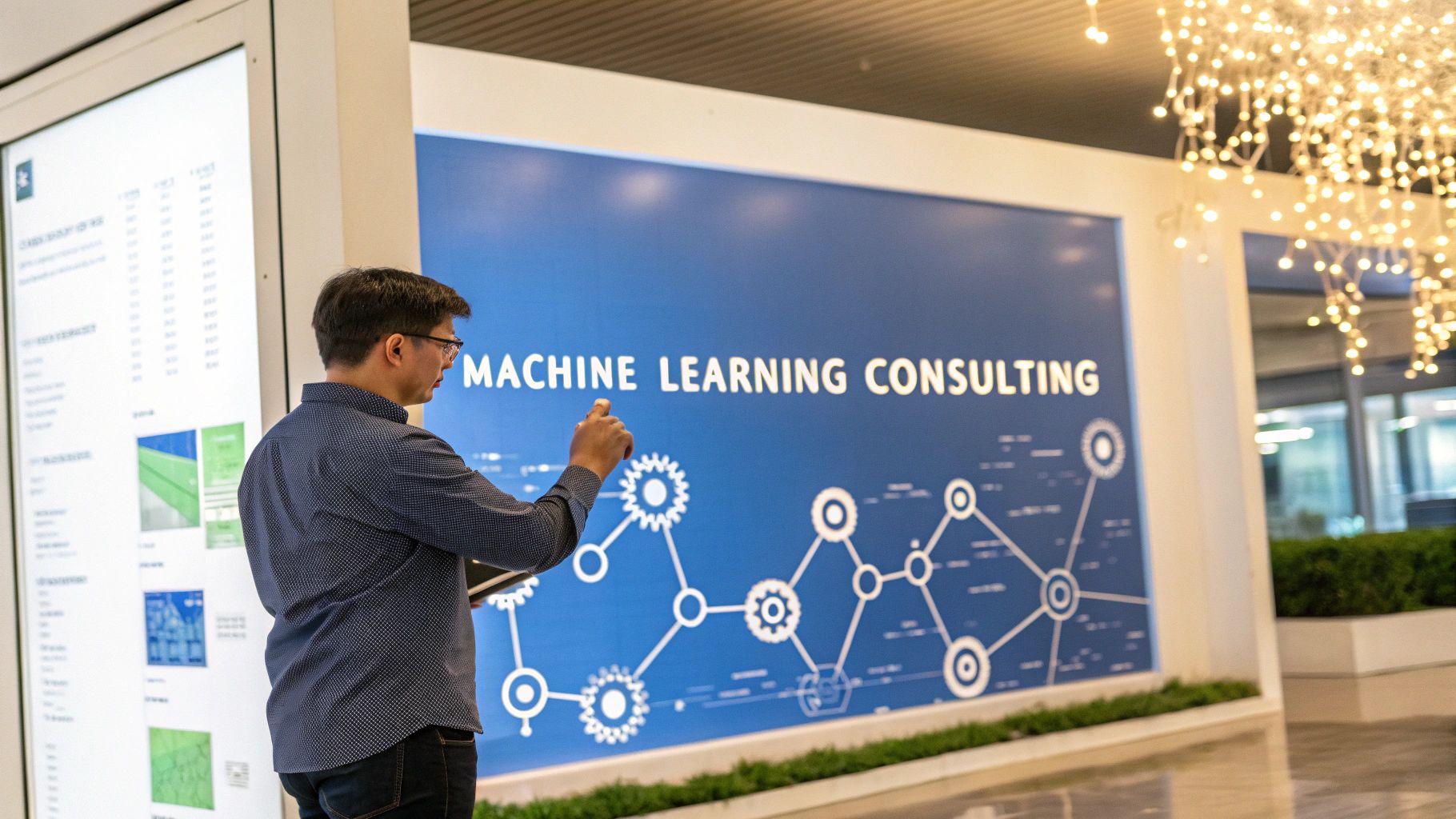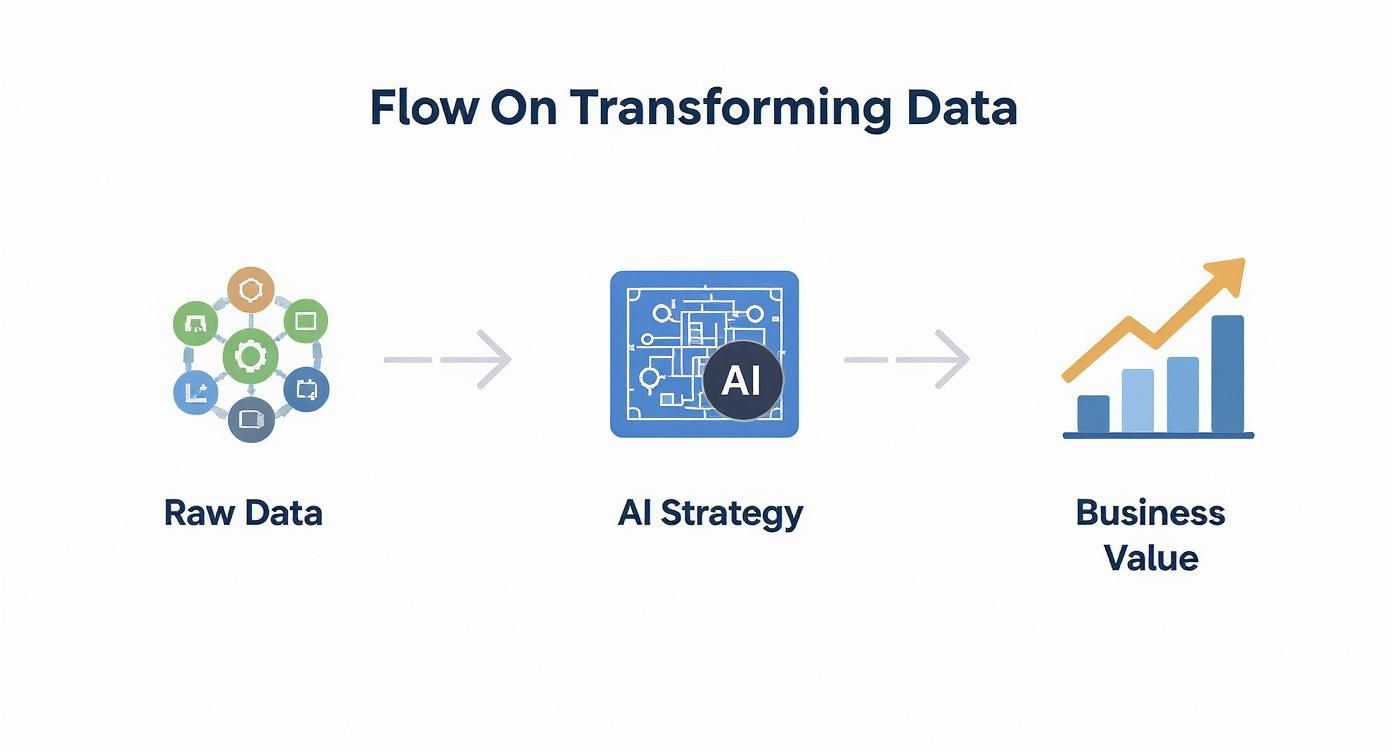Machine Learning Consulting Services That Drive Growth

Think of machine learning consulting as bringing in a specialist team to turn your company's raw data into a real competitive advantage. It's about forming a strategic partnership to solve tough problems, find new efficiencies, and uncover opportunities you didn't even know existed—all powered by AI.
What Exactly Are Machine Learning Consulting Services
Let’s use an analogy. Imagine your business data is a pile of high-quality, raw ingredients. You know you want to create a gourmet meal, but you're not a Michelin-starred chef. A machine learning consultant is that expert chef.
They don't just hand you a generic recipe. Instead, they work with you to understand your tastes, dietary needs, and the occasion (your business goals) to craft a bespoke dish—a custom AI solution—that perfectly fits your company.
This collaborative, tailored approach is what makes machine learning consulting services so different from buying off-the-shelf software. You get a solution engineered to solve your specific challenges, not a one-size-fits-all tool. That might mean building a model to predict customer churn, an AI system to untangle your supply chain, or a recommendation engine that actually drives sales.
Core Focus Areas in Machine Learning Consulting
ML consultants provide a range of services designed to translate data into tangible business results. The table below outlines the key areas where they typically focus their expertise and the value each brings to an organization.
| Service Area | Description | Primary Business Value |
|---|---|---|
| Strategy & Roadmapping | Defining clear, achievable AI goals and creating a step-by-step implementation plan. | Aligns AI initiatives with core business objectives, ensuring a clear path to ROI. |
| Data Readiness Assessment | Evaluating existing data infrastructure to ensure it’s clean, organized, and ready for model training. | Prevents costly delays and ensures models are built on a solid, reliable foundation. |
| Custom Model Development | Building, training, and testing machine learning models specifically for your business case. | Creates a unique competitive advantage with solutions that perfectly fit your operational needs. |
| Deployment & Integration | Implementing the final model into your existing workflows and systems for seamless operation. | Turns a theoretical model into a practical, value-generating tool used in daily operations. |
Ultimately, a consultant's role is to ensure that the investment in AI isn't just a science project but a driver of real-world business outcomes.
This focused approach is why companies of all sizes, from nimble startups to global enterprises, are turning to expert guidance. They’re investing in measurable results, whether that’s boosting efficiency, cutting operational costs, or carving out a serious competitive edge. For a great example of this in action, check out the AI banking revolution and how machine learning transforms finance.
Why Expert Guidance Is a Game-Changer
Jumping into machine learning without a clear strategy is a recipe for wasted time and money. Consultants bring the technical depth needed to navigate the complexities and sidestep common pitfalls. They understand the subtle but critical differences between various models and approaches, which is essential for making smart decisions. For instance, knowing when to use which type of model is a fundamental skill you can learn more about in our guide on deep learning vs. machine learning.
As our speaker Adam Cheyer, a pioneering leader in AI and automation, often emphasizes, the real value isn’t just in the algorithms. It’s in the ability to translate complex technology into meaningful business outcomes that move the bottom line.
They are the translators who turn mathematical models into practical tools that fuel growth and profitability.
The demand for this kind of specialized expertise is exploding. Projections show the global AI consulting market soaring from USD 11.07 billion to an incredible USD 90.99 billion, reflecting a massive compound annual growth rate of 26.2%. This surge isn't just about technology; it’s a clear sign that business leaders now see expert-led AI initiatives as a fundamental strategy for success.
The Blueprint for a Successful ML Engagement
Jumping into a machine learning project without a solid plan is like setting sail without a map. A great engagement with machine learning consulting services always follows a structured, step-by-step process. This blueprint is what turns a raw business challenge into a live, value-generating solution, making sure every move is deliberate, from the first conversation to long-term success.
The whole point is to turn data into strategic action, which means there has to be a clear path from messy inputs to measurable business results.

This visual lays out the journey: how raw data, guided by a sharp AI strategy, ultimately creates real-world business value.
AI Strategy Development
This first phase is arguably the most important one. It has nothing to do with algorithms or code; it’s all about your business. Consultants sit down with your leadership to figure out what a "win" actually looks like. They’ll ask the hard questions to make sure the project is aimed at a real business problem, not just a cool tech experiment.
This strategic alignment involves:
- Identifying High-Impact Use Cases: Pinpointing the exact spots in your operation—like customer retention, supply chain logistics, or fraud detection—where ML can deliver the biggest bang for your buck.
- Defining Success Metrics: Nailing down clear key performance indicators (KPIs) right from the start. We're talking concrete goals, like reducing churn by 15% or boosting forecast accuracy by 20%.
- Creating a Phased Roadmap: Sketching out a practical, step-by-step plan for development and deployment that delivers early wins and keeps the momentum going.
Doing this work upfront prevents projects from turning into science experiments that never deliver actual value. It’s the foundation that everything else is built on.
Data Readiness Assessment
An ML model is only as good as the data it learns from. Before anyone writes a single line of code, a thorough data readiness assessment is non-negotiable. So many projects fall flat because companies think their data is cleaner and more accessible than it really is.
Consultants will dig into your data ecosystem to check its health and suitability. This means looking at data sources, cleaning up inconsistencies, and making sure there’s enough relevant history to train a reliable model. Think of it as a home inspector checking the foundation before construction starts—if the base isn't solid, the whole thing is at risk.
A good consultant will tell you the truth about your data, even when it’s not what you want to hear. Fixing data issues early is far cheaper than finding them after a model is already built.
Custom Model Development
Off-the-shelf AI tools are fine for some things, but most unique business problems demand a custom-fit solution. This is where custom model development comes in. Standard software often misses the specific nuances of your industry or the quirks of your internal operations.
For example, imagine a consumer packaged goods (CPG) company struggling with inventory. A generic forecasting tool might do a decent job predicting national demand, but it completely ignores micro-regional trends driven by local festivals or specific store demographics.
A consultant would step in and build a custom prediction model for this exact scenario. This model could pull in unique data points like local weather, community events, and store-level sales history to create far more accurate forecasts. That level of precision is something a pre-built solution just can't match, and it directly hits the company's bottom line by cutting down on both stockouts and overstock. Our guide on how to implement AI in business dives deeper into building these kinds of specialized solutions.
MLOps and Deployment
Building a powerful model is only half the battle. The final, critical piece is getting it into your live business environment and making sure it stays effective over time. This is where Machine Learning Operations (MLOps) is absolutely essential.
MLOps is all about automating and managing the entire machine learning lifecycle, from start to finish. It’s the bridge between data science and IT operations, creating a reliable system for deploying, monitoring, and retraining your models.
A solid MLOps setup makes sure your AI solution:
- Remains Accurate: Models can get stale as real-world data drifts. MLOps sets up automated retraining pipelines to keep performance sharp.
- Is Scalable: As your data grows, the system can handle the extra load without falling over.
- Is Reliable: It provides robust monitoring and alerts to quickly spot and fix any issues that pop up in the wild.
By following this blueprint, an ML consulting engagement becomes much more than a technical project. It evolves into a strategic partnership focused on building and maintaining a real, lasting competitive edge for your business.
How ML Consulting Drives Real World Success
Blueprints and theories are a good start, but the real test of machine learning consulting services is what they can do out in the wild. This is where strategy turns into actual business results, and data-driven insights become a serious competitive edge. The best success stories aren't just about cool tech; they're about solving nagging business problems that once seemed impossible to crack.
When a company partners with an expert ML consultant, they stop guessing and start making decisions backed by intelligent systems. The results are often fast and tangible, drawing a straight line from a well-run ML project to a healthier bottom line.

From Financial Risk to Customer Trust
Take the constant battle against fraud in fintech. One fast-growing financial services firm was stuck with an old detection system that kept flagging legitimate transactions. Every false positive meant an innocent customer was blocked, causing frustration and chipping away at the trust they had worked so hard to build.
They brought in a machine learning consulting team to build a new fraud detection model from scratch. The consultants dove into historical transaction data, spotting subtle patterns that the old rule-based system was completely blind to. From there, they built and trained a sophisticated algorithm that could understand the context behind a transaction, not just the raw numbers.
The result? The new system slashed false positives by a whopping 40%. This didn't just save the company a ton of time on manual reviews; it dramatically improved the customer experience. By zeroing in on real threats with pinpoint accuracy, they tightened security without alienating their loyal customers—a crucial win in the cutthroat fintech world. If you're curious about this topic, we have a detailed guide on machine learning for fraud detection.
The best machine learning solutions don't just solve a technical problem; they address a core business need. In this case, the goal was as much about retaining customer trust as it was about preventing financial loss.
Optimizing the Real World Supply Chain
Another fantastic example comes from logistics, an industry where every minute and every gallon of fuel counts. A national distribution company was watching its margins shrink because of inefficient delivery routes. Their software just couldn't keep up with real-time changes like traffic jams, bad weather, or last-minute order updates.
Working with ML consultants, they decided to build a dynamic route optimization engine. The project required pulling multiple, messy data streams into one smart system:
- GPS Telemetry: Real-time location data from their entire fleet of vehicles.
- Traffic Data: Live updates on road congestion and accidents from third-party APIs.
- Weather Forecasts: Predictive weather data to anticipate potential delays.
- Delivery Schedules: The daily manifest of stops, time windows, and package priorities.
The consulting team developed a model that could process all this information at once and calculate the most efficient route for every single driver, updating it on the fly. The system was designed to get smarter with every trip, continuously learning and adapting.
The impact was immediate and huge. Within six months, the company saw a 15% reduction in fuel costs, saving millions of dollars a year. Deliveries became more reliable, and customer satisfaction scores shot up. It was a clear, undeniable return on investment that proved how a targeted ML solution can completely reshape physical operations.
Choosing the Right ML Consulting Partner
Picking the right partner for your AI journey is probably the single most important decision you'll make. A great firm doesn't just build models for you; they become a strategic part of your team, guiding you toward tangible business results. But make the wrong choice, and you could be looking at expensive delays and projects that simply never deliver.
The stakes are high. The global machine learning market is set to explode from roughly USD 79.6 billion to an incredible USD 1,325 billion, growing at a blistering 32.48% CAGR. This growth is fueled by massive AI investments, which makes it even more critical to find a partner who can cut through the noise with real expertise. You can get more insights into these market dynamics and see the full research on future AI trends.

Beyond Technical Skills
While technical chops are table stakes, the best machine learning consulting services bring much more to the table. True experts have deep, industry-specific knowledge. They get the unique challenges and opportunities in your sector, whether you're in finance, healthcare, or retail.
Look for a firm with a portfolio of case studies you can verify, ones that actually resonate with what you’re trying to achieve. These success stories are your proof that they can turn complex theory into real-world results that matter to the bottom line. It shows they have both the technical skill and the business sense to pull off a successful project.
As our keynote speaker, Gary Bolles, Chair for the Future of Work at Singularity University, often points out, technical brilliance is only half the battle. The other half is cultural fit. You need a partner who communicates clearly, works collaboratively, and genuinely understands your company’s vision..
This kind of synergy is what turns a typical vendor relationship into a genuine partnership.
Your Essential Vetting Checklist
To help you size up potential partners, use this checklist to guide your conversations. The idea is to get past the sales pitch and into the nitty-gritty of their skills, processes, and overall philosophy.
Here are the key areas to dig into:
- Industry Expertise: "Can you show me some projects you've done in our industry? What were the unique problems you had to solve?"
- Technical Proficiency: "Which ML frameworks, like TensorFlow or PyTorch, does your team primarily use? How do you keep up with all the new tools and techniques?"
- Model Transparency: "How do you approach building explainable AI (XAI)? How will you make sure we understand why the model is making its decisions?"
- Data Governance and Security: "Walk me through your protocols for handling sensitive data. How do you ensure compliance with regulations like GDPR or HIPAA?"
- Project Management and Communication: "What does your communication rhythm look like? Who will be our main point of contact, and how do you report progress and flag potential issues?"
- Long-Term Support: "What kind of support do you offer after a model goes live? How do you handle things like model drift and retraining?"
Asking these direct questions will tell you a lot about a firm’s experience and their commitment to seeing their clients succeed. A truly capable partner will welcome this level of detail and give you straight, transparent answers. Their responses will paint a clear picture of not just what they do, but how they do it—ensuring you find a consultant that’s the right fit for your team.
Understanding Engagement Models and Project Costs
Before you jump into any partnership, you need to get a handle on the financial side of things. Talking about money and structure isn't just a formality—it's what ensures everyone is aligned from day one. Choosing the right way to work with a machine learning consulting service clears up confusion and ties your budget directly to your goals.
There are three typical ways these partnerships are structured. It’s not about finding the "best" one, but about picking the model that fits your project’s goals, timeline, and how much wiggle room you need.
Comparing ML Consulting Engagement Models
To help you figure out what makes the most sense for you, here’s a look at the common models. Think of this as a quick guide to understanding the different flavors of collaboration, each with its own approach to cost, scope, and flexibility.
| Model Type | Best For | Pros | Cons |
|---|---|---|---|
| Project-Based (Fixed Scope) | Clearly defined projects with a finish line, like building a proof-of-concept or a specific prediction model. | Your budget and timeline are locked in. No financial surprises because the scope is set in stone from the start. | Not very flexible. If you want to change or add something, it usually means renegotiating the contract. |
| Time & Materials (T&M) | Exploratory projects where you don’t know the full scope yet, like R&D work or trying out new ideas. | Super flexible. You can pivot and adapt as you learn more. You only pay for the actual time and resources used. | The budget isn't fixed, so costs can climb if the project isn't managed carefully. |
| Retainer-Based | Long-term strategic partnerships where you need consistent access to expert advice and hands-on support. | You have a top-tier expert on call for ongoing guidance, strategy, and continuous improvement. | Might not be cost-effective for a quick, one-off project that doesn’t need any follow-up. |
So, if you have a straightforward goal—like developing a new fraud detection algorithm—a project-based model is a great fit. But if you need an AI expert to guide your strategy and governance over the long haul, a retainer makes a lot more sense.
Key Factors That Influence Project Costs
No two machine learning projects are the same, and neither are their price tags. The cost can swing pretty wildly depending on a few key things. Getting a feel for these drivers will help you set a realistic budget and see the real value behind the numbers.
Here are the main variables that will shape the final cost:
- Project Complexity: It’s one thing to build a simple sales forecasting model. It's another thing entirely to develop a complex computer vision system for real-time object detection. The more sophisticated the algorithms and architecture, the more specialized—and expensive—the talent needs to be.
- Data Quality and Availability: If your data is clean, organized, and ready to go, things can move fast. But if your consultant has to spend days or weeks cleaning up messy data, labeling it, and getting it into shape, that time adds up and increases the cost.
- Required Expertise: The level of specialization matters. Projects that need experts in niche fields like natural language processing (NLP) for analyzing customer sentiment or reinforcement learning for robotics will naturally require a higher investment.
"The true cost isn't just in the code," notes AI strategist and speaker Inma Martinez. "It's in the strategic thinking that precedes it. A well-defined problem and clean data can save you more money than any negotiation."
To get a broader view on financial planning for tech projects, it's worth reading up on unpacking the costs of software development, as a lot of the same ideas apply here. When you understand these factors, you can have much more productive conversations with potential partners and make sure there are no surprises down the road.
Frequently Asked Questions About ML Consulting
Even after deciding to explore machine learning, most business leaders have a few practical questions that need clearing up. Getting these details sorted out upfront is the key to building a great partnership.
Below, we’ve put together some straight-to-the-point answers to the questions we hear most often. Think of it as a final check-in before you kick off a project that could fundamentally change how you do business.
How Long Does a Typical ML Project Take?
This is always one of the first questions, and the honest answer is: it really depends. There's no single timeline because every project's scope and complexity are different.
A quick proof-of-concept or a high-level strategic review might only take a few weeks. These are designed to test an idea's feasibility and sketch out a potential ROI without a huge commitment. On the other end of the spectrum, building a custom model from the ground up and weaving it deep into your existing software could easily take several months.
The biggest factors influencing the schedule are:
- Project Scope: A tightly defined problem gets solved much faster than a broad, open-ended one.
- Data Availability: If you have clean, organized data ready to go, things move quickly. If the data is a mess and needs a lot of prep work, that will add significant time.
- Integration Needs: The more complex it is to connect the new ML model to your current CRM, ERP, or other core systems, the longer the project will take.
Do I Need an In-house Data Team?
Not at all. In fact, one of the biggest reasons companies hire consultants is to get access to top-tier expertise without the cost and time of building a full-time team. It’s a way to bring advanced AI capabilities in-house, fast.
A consulting team can plug in wherever you need them. If you already have a team, consultants can bring in specialized skills you might be missing—like computer vision or advanced Natural language processing. If you don't have any data scientists on staff, they can effectively become your outsourced data science department, handling everything from strategy to deployment.
How Is the ROI of an ML Project Measured?
Measuring the return on investment shouldn't be an afterthought; it should be baked into the project plan from day one. Any good consultant will work with you to define what success looks like in clear, measurable business terms before a single line of code is written.
ROI is always tied to metrics that matter to your bottom line. What those metrics are will depend entirely on the project's goals.
A successful ML project is measured by its impact on the business, not by the elegance of its code. Clear, predefined KPIs are the only way to track true value and ensure the project delivers on its promise.
For example, you could measure ROI through:
- Cost Savings from automating repetitive tasks or making your supply chain more efficient.
- Increased Revenue from a smarter recommendation engine or more accurate sales forecasts.
- Risk Reduction by using a better fraud detection system or predictive maintenance that prevents costly equipment failures.
The consultant’s job is to help you set a baseline for these metrics and then track progress against them to show you exactly what value you’re getting.
Who Owns the Final Model and Code?
This one is crucial, and the answer should be simple and non-negotiable. In any standard consulting agreement, the client retains 100% ownership of everything created. That means the final models, all the source code, and any documentation belong to you, period.
Your contract should state this explicitly. This guarantees you have full control over your new intellectual property. You can modify it, scale it, or have another team maintain it down the road without being locked into a single vendor.
With the global machine learning market currently sitting around USD 93.95 billion and projected to hit nearly USD 1.4 trillion—a compound annual growth rate of about 35%—owning your AI assets is more critical than ever. Europe and North America make up almost 89% of this market, so the competitive stakes are incredibly high. For a deeper dive, check out the full analysis of machine learning market statistics.
Ready to see how a leading AI expert can elevate your next event? At Speak About AI, we connect you with keynote speakers who are at the forefront of machine learning and artificial intelligence.
